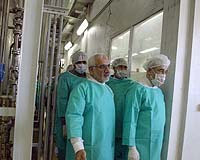| . |  |
. |
Washington (AFP) Jan 5, 2010 The Revolutionary Guard Corps has "gained primacy" in Iran since the 2009 presidential election, fueling fears there that the country is becoming militarized, a Pentagon-sponsored study said Tuesday. The study by the RAND Corporation also urged US policymakers to take "great care" in their statements regarding Iran in order not to give the leadership a pretext to divert attention from domestic troubles, like the economy. The disputed election was "a watershed event" in the Islamic republic's history "that has altered elite relationships and solidified the position of the Islamist right and the Revolutionary Guards in Iranian politics," it said. In the decade after the 1979 revolution, the clerics had the most power, but in the 1990s, new patronage networks not accountable to the state dominated the economy, even if the clerics kept "considerable political influence," it said. "During the past decade, however, the Islamic Revolutionary Guard Corps has gained primacy, using the increased Iranian emphasis on security issues as a political and economic lever," according to Rand, a think tank. The "election further empowered the Revolutionary Guards and has fueled reformist and even conservative fears of a creeping militarization of Iranian politics and society," said Alireza Nader, a study co-author. It urged policymakers to watch the following trends: whether the Revolutionary Guard will continue to grow in power or decline; the relationship between those who overthrew the shah and the post-revolutionary leaders; and political jockeying to find out will become the next supreme leader. It said those three trends have all been affected by the election which gave hardline President Mahmoud Ahmadinejad another term in power. The study urged US policymakers to "take great care to couch their communications with and about Iran in ways that are nuanced and take into consideration how their statements might be perceived in Tehran and by whom." A focus on US or foreign policy "is often a convenient way for the regime to draw attention from bread-and-butter domestic issues that are problematic in Iran, such as the economy," the study said. Speaking to reporters on Monday, US Secretary of State Hillary Clinton had her mind on the Revolutionary Guard. "We have begun discussions with our partners and like-minded nations about pressure and sanctions," said Clinton. "Our goal is to pressure the Iranian government, particularly the Revolutionary Guard elements without contributing to the suffering of ordinary (Iranians) who deserve better than what they are currently receiving" she said. US negotiators, along with their European, Russian and Chinese counterparts, are trying to halt Iran's uranium enrichment program, which the West fears masks a drive to build a nuclear bomb. Iran denies the charge.
Share This Article With Planet Earth
Related Links Learn about nuclear weapons doctrine and defense at SpaceWar.com Learn about missile defense at SpaceWar.com All about missiles at SpaceWar.com Learn about the Superpowers of the 21st Century at SpaceWar.com
 US says door still open on Iran nuclear issue
US says door still open on Iran nuclear issueWashington (AFP) Jan 4, 2010 The United States said Monday "the door is still open" for Iran to meet world demands on its nuclear aims, but warned it was discussing with allies the "next steps" which could include sanctions. The Obama administration's signal of more pressure on the Islamic republic came after Tehran dismissed a US-set deadline of December 31 and issued the West a one-month "ultimatum" to accept a counte ... read more |
|
| The content herein, unless otherwise known to be public domain, are Copyright 1995-2009 - SpaceDaily. AFP and UPI Wire Stories are copyright Agence France-Presse and United Press International. ESA Portal Reports are copyright European Space Agency. All NASA sourced material is public domain. Additional copyrights may apply in whole or part to other bona fide parties. Advertising does not imply endorsement,agreement or approval of any opinions, statements or information provided by SpaceDaily on any Web page published or hosted by SpaceDaily. Privacy Statement |